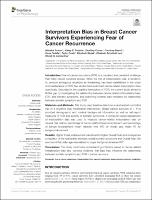Please use this identifier to cite or link to this item:
https://hdl.handle.net/20.500.12202/9388| Title: | Interpretation bias in breast cancer survivors experiencing fear of cancer recurrence. |
| Authors: | Roberts, Kailey E. Tuman, M. M. Corner, G. W. Beard, C. Fadalla, C. Coats, T. Slivjak, E. Schofield, E. Lichtenthal, W. |
| Keywords: | fear of cancer recurrence interpretation bias somatic symptoms breast cancer survivors mediation Psychology BF1-990 |
| Issue Date: | 2021 |
| Publisher: | Frontiers Media S.A. |
| Citation: | Tuman, M. M., Roberts, K., Corner, G. W., Beard, C., Fadalla, C., Coats, T., Slivjak, E., Schofield, E., & Lichtenthal, W. (2021). Interpretation Bias in Breast Cancer Survivors Experiencing Fear of Cancer Recurrence. Frontiers in Psychology, 5194. |
| Series/Report no.: | Frontiers in Psychology; |
| Abstract: | Introduction: Fear of cancer recurrence (FCR) is a prevalent and persistent challenge that many cancer survivors endure. While the role of interpretation bias, a tendency to perceive ambiguous situations as threatening, has been established in the onset and maintenance of FCR, few studies have examined cancer-related interpretation bias specifically. Grounded in the cognitive formulation of FCR, the current study aimed to fill this gap by investigating the relationship between cancer-related interpretation bias, FCR, and somatic symptoms, and examining whether bias mediates the relationship between somatic symptoms and FCR.Materials and Methods: This study used baseline data from a randomized controlled trial of a cognitive bias modification intervention. Breast cancer survivors (n = 110) provided demographic and medical background information as well as self-report measures of FCR and severity of somatic symptoms. A computer-based assessment of interpretation bias was used to measure cancer-related interpretation bias on several bias indices: percentage of cancer-related threat endorsement, and percentage of benign endorsement; mean reaction time (RT) for threat, and mean RT for benign endorsement.Results: Higher threat endorsement was linked to higher Overall Fear and emerged as a mediator of the relationship between overall somatic symptoms and Overall Fear. We also found that older age was related to longer benign endorsement RT.Conclusion: This study contributes understanding of factors related to cancer-related interpretation bias and provides evidence that bias may influence the relationship between somatic symptoms and FCR in cancer survivors. |
| Description: | Scholarly article / Open access |
| URI: | https://libkey.io/libraries/725/articles/570440134/full-text-file https://hdl.handle.net/20.500.12202/9388 |
| ISSN: | ISSN: 1664-1078 |
| Appears in Collections: | Ferkauf Graduate School of Psychology: Faculty Publications |
Files in This Item:
| File | Description | Size | Format | |
|---|---|---|---|---|
| Roberts 2021 OA Interpretation Bias fpsyg-12-682174.pdf | 378.48 kB | Adobe PDF |  View/Open |
This item is licensed under a Creative Commons License

